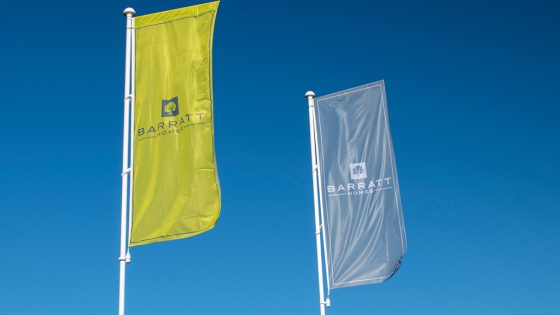Barratt has reported a 76 per cent fall in pre-tax profit after its revenue dropped by £1.15bn.
The UK’s largest housebuilder turned over £4.16bn in the year to 30 June 2024, a 22 per cent drop on the £5.3bn made in its previous financial year, according to results published on the London Stock Exchange this morning (4 September).
The group’s pre-tax profit fell by £534.6m, equivalent to 76 per cent, to £170.5m, while its pre-tax profit margin fell by two-thirds to 4.1 per cent.
Barratt said its decreased profit was due to “lower home completions and average selling prices, reduced margin due to site based fixed cost levels and built cost inflation”.
The group’s total home completions fell by 18.6 per cent, from 17,204 to 14,004, despite Barratt hitting the “upper end of our expectations” for completions in the year.
The group’s net cash fell by 19 per cent to £868.5m.
Barratt’s preferred metric of ‘adjusted pre-tax profit’ fell by 57 per cent to £385m. This figure discounts the impact of £192m that has been put aside to remediate legacy buildings, as well as £22.4m of costs related to the acquisition of Redrow.
Barratt chief executive David Thomas said the UK’s housing market was “challenging” but praised the group’s “solid delivery” and level of housing completions.
He added: “While demand continues to be sensitive to mortgage affordability, and reduced land buying activity during the past two years has had a near-term impact on the number of outlets we are operating from, we are well-positioned to meet the strong underlying demand for new homes of all tenures in the UK.
“We welcome the government’s proposed reforms of the planning system as one of the key levers to increase housebuilding, drive economic growth and tackle the chronic undersupply of high-quality, sustainable homes.”
Commenting on the results, Begbies Traynor partner Julie Palmer said: “It has not been an easy year for housebuilders, yet Barratt appears increasingly confident that a more tangible recovery is starting to take place in the market.
“Labour’s plans to reinvigorate housebuilding, potentially with changes to planning rules, look set to lay the groundwork for Barratt and the wider sector to boost output.
“The promising sounds from the government, coupled with a more favourable macroeconomic backdrop, including an initial cut to interest rates and decrease in building cost inflation, should leave Britain’s biggest housebuilder well placed to deliver sustainable growth.
“However, Barratt is not in the clear yet. The £2.5bn merger with rival Redrow will amplify its recovery, but merging big businesses is no easy task.
“Plus, uncertainty still weighs heavily on the housebuilding sector as it waits for Labour’s promises to translate into real change.”

